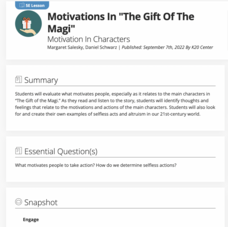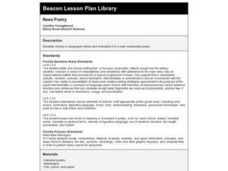Scholastic
Identifying Types of Irony Using "The Gift of the Magi"
O. Henry's "The Gift of the Magi" is the classic example of irony in literature. Teach young writers about the ways irony can engage their readers with an activity in which they write scripts using dramatic irony, situational irony, and...
EngageNY
Grade 9 ELA Module 1: Unit 3, Lesson 11
The study of Romeo and Juliet continues as pairs use the provided summary tool worksheet to record evidence of how Shakespeare uses dramatic irony to heighten the tension in Juliet's soliloquy in Act 3, scene 2, lines 1–31.
K20 LEARN
Criminal Motivations: Irony and Characterization In "The Cask Of Amontillado"
Edgar Allan Poe's short story "The Cask of Amontillado" is a bit of a puzzle. Critics have long debated Montresor's motives for killing Fortunato. Young scholars examine examples of the three types of irony (verbal, dramatic, and...
Curated OER
Irony in Poetry and Prose (Fiction and Non-fiction Texts)
Middle and high schoolers examine the impact of irony in poetry and prose. For this figurative language lesson, they read instructor-selected literature and identify uses of irony. Then they discuss how irony enhances literature.
Curated OER
Irony in "The Gift of the Magi"
Use O. Henry's ubiquitous tale of love and poverty to explore irony. After reading the story, middle schoolers identify examples of all three kinds of irony in the story. With partners, they brainstorm original examples of irony. Then...
Curated OER
"The Story of an Hour" Lesson 2: Teacher's Guide and Notes
After reading background information about Kate Chopin, pupils complete their shared reading of her short story, "The Story of an Hour." Participants then consider the irony of the ending.
Curated OER
Understanding Irony
Students discuss irony. In this language arts lesson plan, students identify irony and give examples of irony from their lives, a book, and current events. Students classify types of irony.
Curated OER
Analyzing Irony in Nonfiction
Students examine the use of irony in non-fiction works. In this literature lesson, students read non-fiction war texts and explore the use of irony in the piece as they respond to discussion questions.
Curated OER
Types of Irony: Examples & Definitions
Isn’t it ironic that many situations labeled ironic aren’t? Properly labeled examples of verbal, dramatic, and situation irony are defined and illustrated in a short, animated video that uses passages from literary works as models. The...
Curated OER
Humor and Irony in Eudora Welty's The Ponder Heart
Young scholars demonstrate an understanding of humor in writing, specifically the use of irony (verbal, situational, and dramatic). They evaluate an event from his or her life that lends itself to a humorous retelling, and demonstrate an...
EngageNY
Grade 9 ELA Module 1: Unit 3, Lesson 17
Romeo and Juliet, Act 5, Scene 3, lines 139-170, is the focus of this day's lesson plan. Readers examine the dramatic irony in Juliet's comments and consider how "lamentable chance" caused by a "greater power" plays a role in the tragedy.
Curated OER
Julius Caesar : Dramatic Reading Project
Learners explore Shakespeare's words. In this literature instructional activity, students memorize and recite a dramatic interpretation of a passage from Julius Caesar.
Novelinks
The Devil’s Arithmetic: Concept Analysis
A helpful guide to Jane Yolen's The Devil's Arithmetic for your literature unit. Use the sections on point-of-view, dramatic irony, and background knowledge, among others, to frame your lessons in an engaging and educational way.
Curated OER
Persona Poem
Students write a poem from the perspective of the first-person persona. Through the words of the poem, demonstrate a higher level of thinking by providing insight to the personality of the poem's speaker, the "I" who is featured in the...
Scholastic
Pre-Reading Vocabulary Activities Using "The Gift of the Magi"
The rich language of O. Henry's "The Gift of the Magi" is only appreciable if you understand the words. A short lesson reviews 13 words from the story and prompts class members to apply each word and its definition to other situations.
K20 LEARN
"The Interlopers": Are You Ready to Rumble? Conflict, Motivation, and Setting
Capulets and Montagues. Sharks and Jets. Nortenos and Surenos. Gradwitzes and Znaeyms? Hector Hugh Munro's short story "The Interlopers" invites high schoolers to consider the causes of conflicts and reflect on what it takes to resolve...
K20 LEARN
It Wasn't Me: "The Crucible"
Scholars complete their study of the collective fear in Arthur Miller's "The Crucible" by conducting a mock trial to determine how many witches are in the class. Groups then analyze sections of the play for the literary devices used and...
K20 LEARN
Motivations In "The Gift Of The Magi": Motivation In Characters
O. Henry's short story, "The Give of the Magi," launches a study of what motivates people to act as they do. Class members identify what they believe are the motivations of the characters in O. Henry's tale and then craft a one-page...
Maine Content Literacy Project
Introduction to John Updike
Expand your pupils' understanding of the short story genre with a study of John Updike and his story "A&P." This lesson plan, the fourth in a series of fourteen, invites learners to examine literary terms and read and discuss the...
Curated OER
News Poetry
Third graders select a small item in a newspaper and then dramatize it in a well-constructed poem. They share their poems with the class.
Curated OER
Analyzing Literary Devices
Eighth graders identify figurative language and poetry in this literary analysis lesson. Using Through the Looking Glass by Lewis Carroll and a YouTube video for "The Walrus and the Carpenter," young readers complete a literary device...
Curated OER
Rural Life During the Great Depression: A Year Down Yonder
“Anyone who thinks small towns are friendlier than big cities lives in a big city.” Mary Alice, the fifteen-year-old narrator of A Year Down Yonder, is forced to leave Chicago and spend a year with her Grandma Dowdel in a small rural...
Curated OER
"The Cask of Amontillado" Study Guide
For this study guide worksheet, middle schoolers complete 10 vocabulary definitions, 8 literary terms definitions and 11 short answer questions about the story.
Curated OER
Managing the Teaching-Learning Process
Twelfth graders begin to recognize how 2,400 year-old dramas are applicable to their lives after reading OEDIPUS THE KING, AGAMEMNON, ANTIGONE, MEDEA, HIPPOLYTUS, and FROGS.
Other popular searches
- Kate Chopin Dramatic Irony
- Examples of Dramatic Irony
- Poetry Dramatic Irony
- Dramatic Irony Video
- Macbeth and Dramatic Irony
- Dramatic Irony Greek
- Awakening Dramatic Irony
- The Awakening Dramatic Irony
- "Poetry Dramatic Irony

























